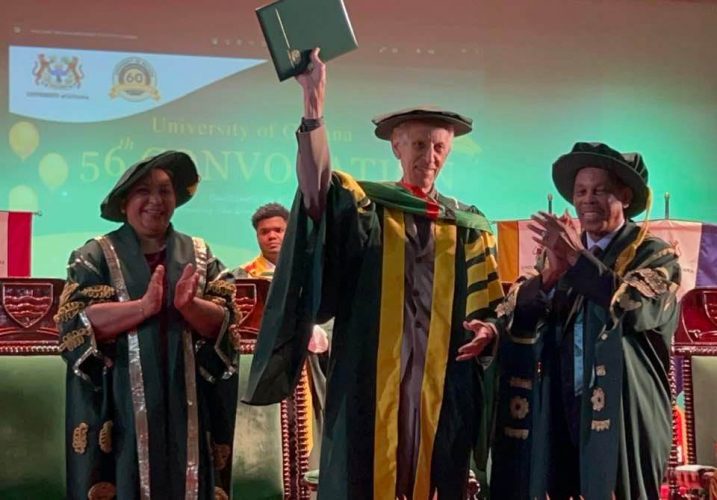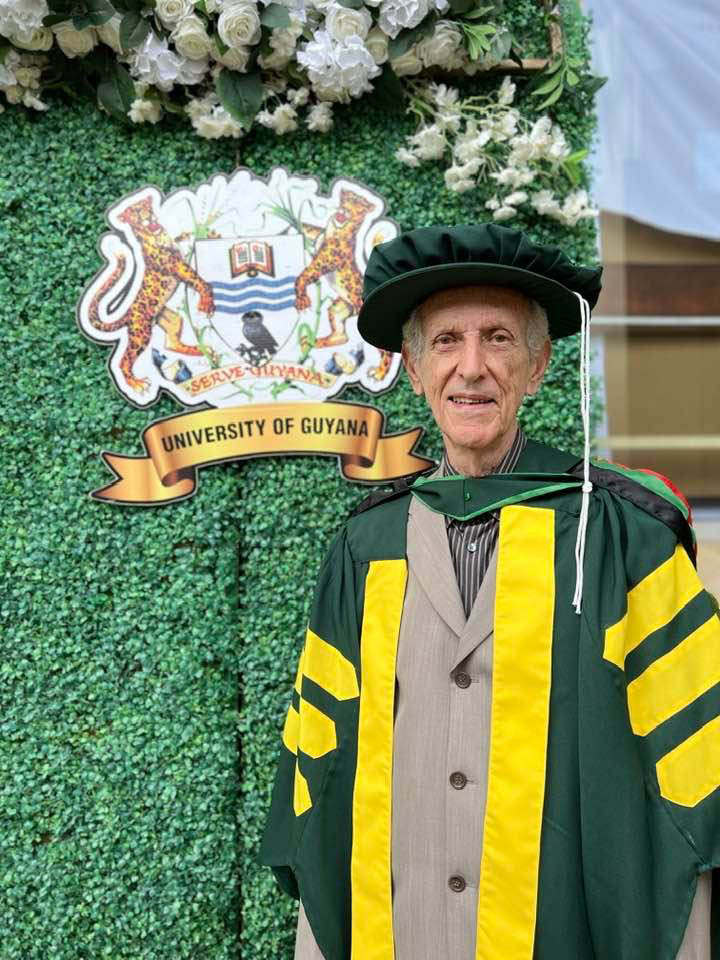 Last week, at its 56th Convocation, the University of Guyana (UG) conferred upon David Anthony Martins the honorary degree of Doctor of Letters. This was not only a significant milestone for the university, it was an act towards the advancement of the arts of a nation, and the recognition of exceptional artists. It also proclaimed UG as an institution associated with excellence that is prepared to give high recognition to what an artist has contributed to the nation.
Last week, at its 56th Convocation, the University of Guyana (UG) conferred upon David Anthony Martins the honorary degree of Doctor of Letters. This was not only a significant milestone for the university, it was an act towards the advancement of the arts of a nation, and the recognition of exceptional artists. It also proclaimed UG as an institution associated with excellence that is prepared to give high recognition to what an artist has contributed to the nation.

An honorary doctorate – Letters, Laws, or Science – is a university’s way of giving public recognition to the body of work achieved by an individual in a particular field of endeavour. It grants them the equivalent of a PhD, bypassing formal academic work and the writing of a thesis. It recognises the work done by the individual in practice as amounting to the equivalent of, or more than, the work done normally for a PhD. At the same time, the degree granting institution can get a good deal of mileage from its association with the individual, whose fame will enrich the university’s image.
As songwriter, singer, musician, band leader, producer, stage performer, comedian, night club operator, playwright, newspaper columnist, and cultural administrator, Martins’ contribution to the nation’s culture is unparalleled.
He led the Tradewinds, which was formed in 1966, as songwriter and lead singer, producing a body of music amounting to dozens of hit songs that commanded the attention of the entire Caribbean in the region and in the North American diaspora for some 50 years. These songs were mainly satires in calypso style, social comments on the manners, mores and behaviour of West Indians, as well as comic sketches providing humour, entertainment and social reflection.
The music made a lasting impact on the region. The name Dave Martins and the Tradewinds became household words and multitudes can sing the songs word for word. Martins is distinguished for having led this popular wave that appealed to West Indians and contributed to identity and the delineation of the character of the people. They are more than ephemeral popular numbers, because songs released in the 1960s, 1970s, 1980s and 1990s have remained prominent.
A few of them, famous for their wit or satire, include “Honeymooning Couple”, “Cricket in the Jungle”, “Civilisation”, “It’s Traditional”, “Copycats”, “Guyana Coming Back”, “Wong Ping”, and West Indian Alphabet”. They all speak to the longevity, appeal and importance of the music as a definer of West Indian society. For his countrymen, the most extraordinary and renowned has to be “Not A Blade of Grass” with its catchy chorus:
We ain giving up no mountain
We ain giving up no tree
We ain giving up no river
That belong to we
Not one blue saki
Not one rice grain
Not one cuirass
Not a blade of grass
It appeals to the population, is well known, and committed to the emotions, national sentiment, and the patriotism of Guyanese. So popular and impactful did it become, that it is acknowledged as the second and the unofficial national anthem of Guyana.
The song gained currency as a defiant chorus against the claim of Venezuela to Guyana’s land space, but Martins has described it as “a love of country song”. He wrote it one day while he was visiting Guyana and it was prompted by something said to him by an announcer during an interview on the radio. He borrowed an acoustic guitar, went to his hotel room at the Pegasus and composed it.
Martins was born and grew up on the West Demerara and went to secondary school at St Stanislaus College in Georgetown. He later worked for some time at the Timehri Airport. It was after migrating to Canada that he ventured into music, performance and a career that was to be defining, dynamic and enduring. He lived in Toronto and performed at the Bermuda Tavern and at the club he established and named We Place.
The name of the band has a significant ring. The trade winds are well known in the Caribbean as winds that blow constantly from east to west just north of the equator. They have had a very great impact on the region, particularly during the days of sailing ships. The band became quite a force in the region, sending strong currents across it with the power of the music, just like the winds from which it took its name.
In similar fashion, We Place in Toronto was defining because of the language that meant so much to Martins. He has remarked that many people in Toronto thought the name meant “a little place” because of the adjective “wee” Scottish for little. On the contrary, it really meant “our place”. That was very important for Martins because of his loyalty to Guyanese Creole language (Creolese) which was drawn upon for that name. It was a title of identity and ownership, and expressed itself in the language used by Martins in his songs. He also has a very strong sense of identity.
That importance extends into the meaning of so many of the songs, which satirise or comment on West Indian culture and behaviour. Martins is an expert storyteller, which is evident in the songs and elsewhere. In the latter part of his career he performed a one-man act on stage, using music and drawing on the tradition of stand-up comedy and Caribbean storytelling.
This skill also came into play after 2007 when he started writing a weekly column in the Stabroek News called “So It Go”. That Sunday feature provided valuable insights into Martins’ career, adventures and thoughts. He explored themes on culture and language. Several stories taken from his life and encounters with colourful characters enriched the columns, as well as his analysis of music and cultural change, such as those affecting the calypso and soca.
Martins ventured out of Toronto on several occasions to perform around North America and made several visits to the Caribbean; mainly Trinidad, where he performed in Carnival, and Guyana, his native land. He later moved to the Cayman Islands where he worked in the administration of culture in a post now held by compatriot Henry Mootoo. Martins was also appointed Artist in Residence at the University of Guyana – a position with a one-year term, during which he gave public lectures and a command performance.
Over the years, Tradewinds’ band members changed, but they always represented West Indian nations. At one time, the group comprised Martins (Guyana) songwriter, guitar and vocals; Clive Rosteing (Trinidad) on drums and vocals, Jeff Japal (Grenada) on keyboard, Richard Terry (Cayman Islands) on bass and Harry Cupid (Barbados) on percussion and vocals.
The world has been recognising work of this nature and admitting it into the mainstream of literature. The greatest testament to this was the award of the Nobel Prize for Literature to Bob Dylan. The University of Guyana is in keeping with this trend in the degree awarded to Dr Martins as well as the Honorary Doctor of Letters conferred on Guyanese international superstar Eddy Grant four years ago.






